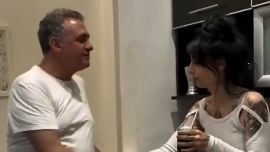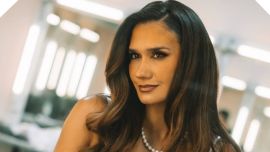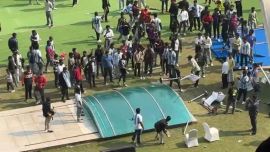New year, a new series. The pre-electoral province-by-province analysis in the first half of last year jumped straight to the global sphere in the second while awaiting definition at national level. Having looked at Argentina’s relations with various international organisations, the intention had been to sharpen the focus to first continents and then key nations this year. But this new year also comes with a new government whose agenda is so domestically driven that President Alberto Fernández has cancelled all his overseas trips for now (even if presumably exempt from that 30 percent surtax slapped on spending abroad). Nor does it seem to make much sense to sketch Argentina’s relations with say, the European Union or the Organisation of African Unity at a time when all eyes worldwide are on Iran. So the planned continuation of “Global Perspective” has not been scrapped but suspended until further notice.
Instead the first half of this year will feature a 20-plus-part series on the 20 ministries comprising the new Cabinet and various other officials also named last December 6 (e.g. the presidential staff, AFIP tax bureau, etc.) as well as the Central Bank. The ministers themselves clearly only have a relative importance with no provision for Cabinet meetings and not much role even with announcements in a hyper-presidential scheme of communication – while introducing the new ministers, the main focus of these columns will be the cluster of problems and challenges facing each ministerial area and the plans (if any) to deal with them.
So which ministry kicks off this series? The choice is fairly automatic – the Foreign Ministry. Not only does this portfolio offer the smoothest transition between “Global Perspective” and this new series but it is also highly topical – not so much because of Iran as this week’s break with the previous Kirchnerite policy of indulging Venezuela’s Nicolás Maduro regime by condemning the “inadmissible” harassment of politicians and the press (without actually using the D-word – dictatorship). Moreover, the introduction of this series has already eaten up much of the space but I make no apology for that – whenever “Global Perspective” is resumed, it will be dedicated to Argentina’s foreign policy week after week (a prospect not enjoyed by other ministries).
Time to meet the minister. As it happens, Felipe Carlos Solá was born in Recoleta on exactly the same day as this columnist, if my 2am birth in Liverpool is measured according to the Argentine time zone. A trained agronomist, Solá began his political career in 1987 when he became the Buenos Aires provincial Agriculture Minister under Governor Antonio Cafiero (the grandfather of the new Cabinet chief), quickly passing to national level to become Agriculture Secretary throughout almost the entire 1989-1999 Carlos Menem decade, apart from two years in Congress. Running-mate of Carlos Ruckauf on the victorious Peronist Buenos Aires gubernatorial ticket in 1999, he advanced to governing Argentina’s most important province in 2002 when Ruckauf became the 135th of Argentina’s 142 foreign ministers since 1822 – he was then elected governor in his own right in 2003 with 43 percent of the vote (almost twice the tally of Néstor Kirchner at national level). But he remained an agronomist at heart, clashing with then President Cristina Fernández de Kirchner in 2008 over grain export duties and becoming a dissident Peronist from then until mid-2019, allied to (now Lower House Speaker) Sergio Massa from 2013 to 2018, and then briefly forming his own Red por Argentina splinter, before finally rejoining the Frente de Todos fold.
Solá would thus be perfect for the Agriculture portfolio while three decades of political experience would also qualify him for various other ministries but he has no known background in the diplomatic field – which did not stop him from being the frontrunner to head external affairs from the moment Frente de Todos loomed as Argentina’s next government exactly five months ago today, despite various attractive and more seasoned alternatives, such as former United States and United Nations Ambassador Jorge Argüello (now back in Washington after the Donald Trump administration accepted his credentials last Tuesday) or the ex-ministers Rafael Bielsa and Jorge Taiana.
Last weekend’s reproach of the Maduro regime sees Solá’s ministry breaking surface for virtually the first time during its maiden month in office. The initiative responds to the more moderate tendencies of the presidential wing of the Frente de Todos coalition but also to other motives. Only the previous week a Trump administration official had broadly hinted that Argentina’s new government was “crossing a red line” by cosy-ing up to Maduro while giving shelter to leftist Bolivian ex-president Evo Morales (it would seem that Trump is multiplying his red lines beyond killing US contractors in Kirkuk), aberrations which should be corrected on pain of risking entry into negotiations with the International Monetary Fund without the support of its biggest shareholder while Vaca Muerta shale remains starved of investment. Ticking off Venezuelan oppression thus throws Washington a bone regarding one of these complaints at least.
But raising the issue of Venezuela also has the virtue of changing the subject – while most countries in the world merely feel helpless in the face of the Iran crisis, Argentina’s new government has its own reasons to digress. Reasons which centre around special AMIA prosecutor Alberto Nisman, the fifth anniversary of whose baffling death will be upon us next Saturday. Now is not the time to remind the world of the infamous Memorandum of Understanding with Iran drawn up in 2013 by the late Foreign Minister Héctor Timerman, with the current vice-president’s blessing.
All baby steps – pending future definitions, a couple of historical and structural lines about the Foreign Ministry. Scant room to describe the 142 ministers in almost two centuries but they include five presidents and a Nobel Peace Prize winner, Carlos Saavedra Lamas, as well as the names of numerous city streets and buildings. Turnover has historically been high with only Saavedra Lamas reaching five years in office before 1983 – since then Guido Di Tella (almost nine years), the Radical Dante Caputo, Taiana and Timerman have served half a decade or more. At the end of 2018 the Foreign Ministry had 2,600 employees and a budget of 8.5 billion pesos with embassies and/or consular representation in 123 countries around the world.
Hardly any space left for such major foreign policy issues as China (with the future ambassador yet to be named) or the EUMercosur agreement (here Solá blames Brazil’s difficulties with the regional trade bloc rather than his own party’s protectionist noises during the election campaign, also expressing a distinct preference for the left-leaning populism of Mexico – where he spent most of last week for the CELAC summit – to the far right populist Jair Bolsonaro now ruling the giant neighbour). But no matter – still early days and plenty of columns to analyse a more evolved foreign policy once “Global Perspective” resumes.



















Comments